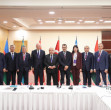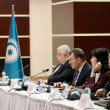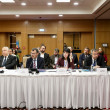TÜBA is the New President of UNASTW
The VII. General Assembly Meeting of the Union of National Academies of Sciences of the Turkic World (UNASTW) was held.
At the meeting of UNASTW, which includes TÜBA, Turkish Academy, Azerbaijan National Academy of Sciences, Kazakhstan National Academy of Sciences, Kyrgyzstan National Academy of Sciences, Bashkortostan Academy of Sciences and Tatarstan Academy of Sciences, current issues regarding scientific cooperation among Turkic states, opportunities and expectations for the implementation of research programs and projects that Turkic states can carry out jointly were discussed.
UNASTW, working to promote comprehensive cooperation in the field of science and education among Turkic societies, convened to discuss topics such as consolidating the practice of joint work between academies and ensuring the continuity of communication, sharing and developing the results and achievements obtained, and better serving the common interests of the Turkic scientific world with a systematic and project-based approach.

Our UNASTW Presidency will carry our cooperation forward.
The program was opened with speeches by the President of the Turkic Academy Prof. Shahin Mustafayev and Chairman of the Council of Elders of the Organization of Turkic States Binali Yıldırım.
The chairmanship of the Union was handed over to TÜBA President Şeker by Aynur Temirhanov, Vice President of the Tatarstan Academy of Sciences. President Şeker started his speech by emphasizing that the transfer of the term presidency from the Tatarstan Academy of Sciences to TÜBA is an important step to further scientific cooperation in the Turkic World.
Underlining that the strong ties that exist in the vast geography of the Turkic World due to the common history increases the importance of scientific cooperation day by day, Prof. Şeker stated that scientific studies and research play a vital role in the development and progress of societies. The cooperation of the academies of the Turkic world is of great importance in terms of sharing knowledge and experience, developing joint projects and opening new horizons for young scientists.
Stating that one year for the Presidency is not enough time to fully realize the goals set and to realize permanent projects, Şeker said that increasing this period to three years will allow for the planning and implementation of more comprehensive and long-term projects. "This change will both strengthen the institutional memory and give the presiding academies more time to deepen their scientific collaborations. A three-year presidency period is also very important for projects to mature and achieve sustainable results. In this way, the quality of scientific research and studies will increase and the scientific potential of the Turkic World will be revealed more effectively."
The term of the Presidency should be increased to 3 years for an effective term.
Prof. Şeker also informed that the summer school programs and scholarship activities organized by TÜBA for the Turkic World will continue. Şeker said that these activities offer young scientists the opportunity to participate in advanced research, improve their skills and reinforce the sense of unity and cooperation among the future leaders of the Turkic world. He said that preparations are underway for the summer schools in Kazakhstan, which will be organized simultaneously in the thematic areas of Turkology and Energy. "By investing in these educational initiatives, we not only enrich the academic and professional lives of our students, but also strengthen the ties between our countries. These programs aim to bring together bright minds from across the Turkic World to share ideas, innovate and build a better future together. As a result, I am confident that this strong cooperation between the Turkic World Science Academies will lay a solid foundation for future generations." He reiterated that the extension of the term of the chairmanship to three years will ensure more effective cooperation and significant contributions to the scientific field.












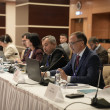
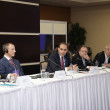
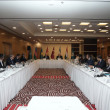
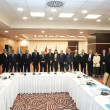
.jpeg)
